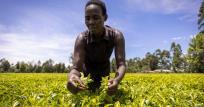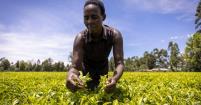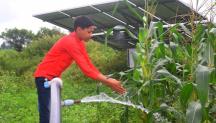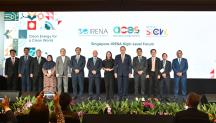

Affordable Biogas System Improves Farmers’ Quality of Life in a Kenyan Village
Newsletter
For the past five years, Risper Bett, a 54-year-old homemaker and farmer in the village of Kericho, Kenya, has been enjoying her free time growing flowers around the house, and even taking rest time in her garden. Before, she never imagined being able to do those things, which are now possible since she and her family started using biogas for cooking and farming.

In the late 2018, Risper and her husband were introduced to biodigesters, which take organic or animal waste – continuously available for Risper who owns cows in the farm – and transform it into renewable biogas and organic fertiliser. The end products of the biodigesters are then used for cooking and farming activities.
Waste-to-energy can play an essential role in accelerating the energy transition and addressing issues related to waste treatment. Not only will it contribute to reducing waste, but also to pollutions that have been the cause of health problem for women in households that are still using traditional biomass.
Cooking with traditional biomass fuel and inefficient cookstoves put women disproportionately at health risks associated with household air pollutions. In addition, as in many developing countries, the burden of the labour-intensive firewood collection often falls on women’s shoulders, consuming women’s time and energy.

Upon visiting one of his friends who uses the technology, Risper’s husband learned of biodigesters’ uses. Sharing the excitement over the potential benefits that the technology could bring to the family, Risper and her husband agreed to buy and install one at their house.
But biodigesters are not cheap items that low-income farmers in Kenya can readily purchase. End-user affordability, especially among low-income households has been an obstacle to the adoption and sustained use of renewable clean cooking fuels and technologies. Specifically, high cost of appliances and fuels as well as lack of access to affordable capital are identified as barriers to the use of bioenergy for clean cooking in countries like Kenya.
Understanding the urgency to solve key development issues through clean cooking, the government initiated the Kenya National Clean Cooking Strategy to ensure universal access to clean cooking by 2028. The strategy includes leveraging government resource allocations, private sector investments, carbon finance, public finance, philanthropic contributions, and development agency assistance, which could bridge the affordability gap.
This is where instruments like results-based financing (RBF) fit in. RBF ensures that development funding is linked to pre-agreed and verified results, and that funding is provided when the agreed outcomes are achieved. Impact bonds for example, are a type of RBF that reward investors for successfully delivering development impact.
Fortunately for Risper and her husband, Sistema.bio, the company from which they planned to buy the biodigester, has an RBF scheme to lower the product cost for consumers. Normally sold at a price range of USD 1,370, the biodigester was bought by Risper and her husband the following year in monthly installments at a lower price. “We paid USD 690 in installments of USD 86 over a period of 8 months, which was actually less than what we were spending on energy every month,” she said.
She further explained on the cost savings, "We used to spend so much just on energy alone. Every month, we bought liquid petroleum gas for USD 23, a bag of charcoal for USD 19, and more than USD 23 on firewood. On top of that, we spent around USD 39 on chemical fertilisers for our tea farm. And those expenses did not yet even include food, school fees, and daily expenses."

The impact bond that the company implements with its partners aims to improve health and increase women’s quality time through the use of biogas digesters. It sells ‘social and environmental impacts’ to an outcome buyer. An investor then provides upfront working capital financing to the biodigester producer, who uses the fund to scale up operations to reach low-income customers. The positive impact on health and gender of the biodigester use will then be verified. If proven to be achieved, the outcome buyer will pay for the health and gender outcomes while also repaying the investor for the upfront capital.
The health and gender outcomes were quantified and measured using the beneficiary’s health and quality time improvements as baselines. This is true for the case of Risper and her family. “I used to wake up as early as 4 a.m, but now I can sleep until 6 a.m as I no longer have to wake up early to look for firewood or buy charcoal which has become very expensive,” she explains with a sense of relief.
Once a dreaded chore, cooking has become something Risper enjoys. “My husband, who’s retired, now helps me with cooking because he does not have to bend for long hours in the smoky kitchen. He is able to cook on the table stove while standing. Cooking time is shorter now, and shared between the two of us.” This shift in the household dynamics has further strengthened their relationship.

In Sub-Saharan Africa, only 7% of rural households cook with clean fuels and technologies, compared to 40% in urban areas. The region remains the only one where the number of people without access is still rising, mainly due to population growth outpacing clean cooking progress. Since biogas digesters have the potential to serve 18.5 million households in Sub-Saharan Africa, it is important to increase bioenergy use for clean cooking.
To accelerate the transition to clean cooking technologies and fuels among others, the Kenyan government established a Bioenergy Strategy (2020-2027) which promotes sustainable bioenergy production and consumption. It is a step in the right direction, but more push for implementation is needed to grow the capacity of bioenergy for clean cooking. In the case of biogas, only 2 Megawatts of power capacity was achieved in Kenya by 2023.
For Risper’s family, the use of biodigester goes beyond cooking. “We also use it for heating water to milk our 12 cows. We milk twice a day, so that’s a lot of water to heat. We are tea farmers as well. Our tea farm has almost doubled in productivity since we use the biofertiliser,” she said.
By adopting biogas, families like Risper’s are improving their qualities of life. “With the extra time, I’ve been able to focus more on our tea farm, which is a big source of income for us. I also tend to my vegetable garden, where I grow food that I sell to my neighbours,” said Risper.
The success of the biodigester in Risper’s household did not go unnoticed by the surrounding community. As one of the first families in their village to adopt this technology, they opened their home to the neighbours who were curious about the system. Seeing the benefits firsthand, many have since installed biodigesters in their own homes, enjoying more quality time in their rural homes and contributing to the increased use of biogas for clean cooking, aligned with the national strategy.
Photo Credit: Sistema.bio




